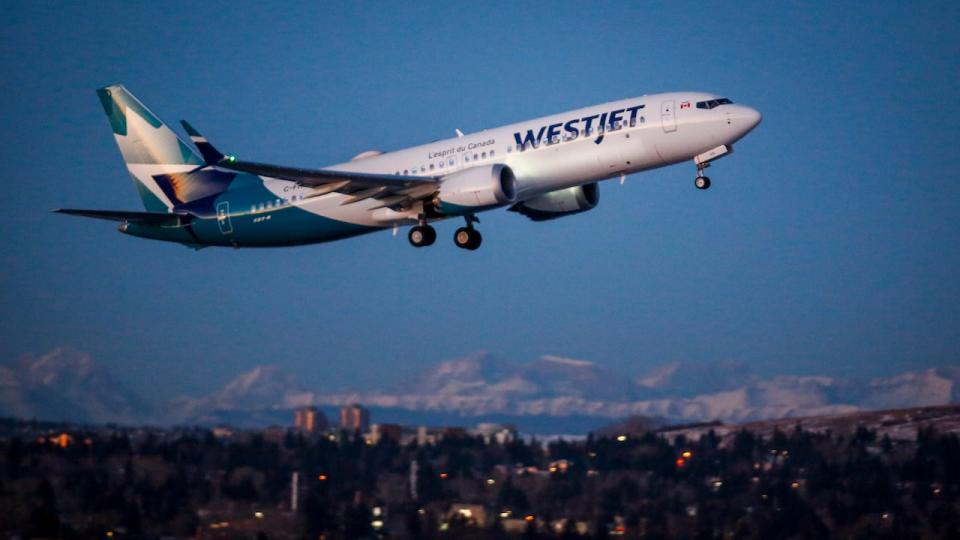Q & A: WestJet CEO Alexis von Hoensbroech talks air travel costs and new reduced-fare category

WestJet is set to introduce new measures in a bid to make flying more affordable for passengers across the country.
WestJet CEO Alexis von Hoensbroech announced Wednesday that the airline will soon offer a new reduced-fare category for customers who would like to fly at cheaper rates and are OK to forgo carry-on bags.
Von Hoensbroech also said he'd like the federal government to consider reviewing the fees that are added to ticket fares for airport maintenance and other infrastructure-related costs.
"I think we have to recognize that air travel in Canada is actually more expensive than in many other countries," von Hoensbroech said in a recent interview with the Calgary Eyeopener.
"One of the reasons is just the size of the country and the distance of flights, which makes it just expensive to fly. But the other thing is that [the] infrastructure cost for air travel is actually very expensive as well, and far more expensive than you would see it in other countries."
Loren McGinnis, the host of the Calgary Eyeopener, asked the WestJet CEO about the airline's new reduced-fare category, airport rents and bringing down air travel costs.
LISTEN | WestJet CEO on reducing air travel costs:
The following has been edited for length and clarity.
Loren McGinnis:You're calling for some major policy changes to address affordability.What fees do you want reviewed and changed?
Alexis von Hoensbroech: We have to recognize that air travel in Canada is actually more expensive than in many other countries and there are two reasons for it. One of the reasons is just the size of the country and the distance of flights, which makes it just expensive to fly. But the other thing is that [the] infrastructure cost for air travel is actually very expensive as well, and far more expensive than you would see it in other countries. Infrastructure costs includes fees for airports, for security, for air traffic control plus taxes and fees that are being put out by or controlled by the government. And these fees have been constantly going up over the last year.
So compared to 2019, they've been going up by 15 per cent. That's a pretty high hurdle. And that's why we are, we are proposing two things. So first of all, the government shouldn't increase this burden any further, because all of this is just driving up ticket prices. So not increase any of the fees and not to move forward on any policy changes that will make air travel even more expensive.
And the second thing that we are suggesting is that the government should actually stop collecting rent from airports. So the government collects around almost half a billion dollars per year from airports around the country and this money is going to the federal budget instead of being available for the airports to either invest into infrastructure or lower their fees and with that, lower ticket prices.
Are you advocating essentially for a government subsidy of air travel rather than having travellers and airlines pay that?
AvH: It's the other way around right now. So airlines and then eventually air travellers are paying this rent to the government, which is very unusual. In other countries, you wouldn't have this. And this is actually a subsidy if you want to call it so, from the travellers to the government because this money just goes into the federal budget. It's not supporting infrastructure.
What I'm suggesting is that the government should stop collecting additional money beyond the cost of the infrastructure from travellers to fund itself, but should leave this money with the airports and allow them to upgrade the infrastructure or lower the fees which would result in lower ticket prices.
WestJet will be introducing a new pricing tier where passengers will have less legroom [and] will not have access to overhead bins. What do you say to people who feel like they're being nickelled and dimed every step of the way in terms of air travel?
AvH: We want to give affordable travel options to our guests. We want to get ticket prices as far down as possible and then give our passengers a choice [of] what they want. We have very different types of passengers … we have passengers that actually are guests [who] want a premium service or want premium seats and want lots of flexibility and then they get it, but obviously at the higher ticket price. And then we have other guests that actually want the lowest possible transportation.
In all [the] services that we do, we know that the one most important thing that our guests want is a cheap ticket price. And for those [guests], we want to create a choice where they can actually travel much cheaper than they could travel on other service levels.
I think that's what people want. People want to choose. They don't want to be dictated by us.

A WestJet Boeing 737 Max takes off from Calgary for Vancouver on Jan. 21, 2021. According to WestJet's CEO, while restructuring the production process at Boeing has slowed down deliveries for the airline, they've identified the problem and are actively working on a solution. (Jeff McIntosh/The Canadian Press)
You're in a deal with Boeing to buy 42 737 Max 10 jetliners. That's a lot of planes. That's a significant deal. How are Boeing's woes affecting WestJet?
AvH: They affect us mainly through a slower pace of deliveries and delays. But let me just do a little shout out to Boeing. I think … [they] certainly have things to fix and so no doubt about it. But I think the public sentiment is worse than the reality. I spent two days in Seattle just a few weeks ago and walked the entire production line, met with all their executives and I think they have a very good understanding on what is not well in their production. And they are fixing this from the very root cause.
But as they restructure their production process, it's just slowing down deliveries and that's causing an issue. Nevertheless, they produce great airplanes and they produce safe airplanes. We fly more than 140 Boeing airplanes right now. Every two minutes, one of these planes takes off or lands somewhere. And these are all great and wonderful and safe airplanes that are well manufactured and well maintained by our maintenance team.
I want to talk about a very regional dimension of what you do, and that's the service in and out of Medicine Hat. There are now fewer flights servicing Medicine Hat from three a day to one a day, but on a bigger aircraft, as I understand it. Why did you make that change?
AvH: In the past, we actually had a capacity purchase agreement with another airline which is Pacific Coastal and they were operating a couple of pretty small turboprop airplanes on our behalf. And these were the airplanes that were … serving some smaller communities like Medicine Hat and Lethbridge. So this did not really work out the way we had anticipated. And therefore we decided that we changed the service pattern.
So this contract is going to run out. So we will not have these very small turboprop airplanes anymore. But of course, we want to continue serving those communities and providing a connection into Calgary. And that's why we are now switching to the next figure airplane which has 78 seats instead of [the] 34 seats which the smaller ones had. And since this is [a] much bigger airplane, we have to reduce the frequency.
What would it take for you to have more than one flight in and out of Medicine Hat every day?
AvH: Medicine Hat is an important community. However, it is just as small as it is. So you don't want to fly around with planes that have [a] 20 per cent load factor. That's just the consideration that we would have to make. Right now, we do provide all the connections that people want to have. So people can fly from Medicine Hat to Calgary and they get all their connections.
But I do understand it's less convenient to have one flight compared to three flights. But it was just not economical. And at the end of the day, we have to do what also works out and fits the demand pattern that we see.

